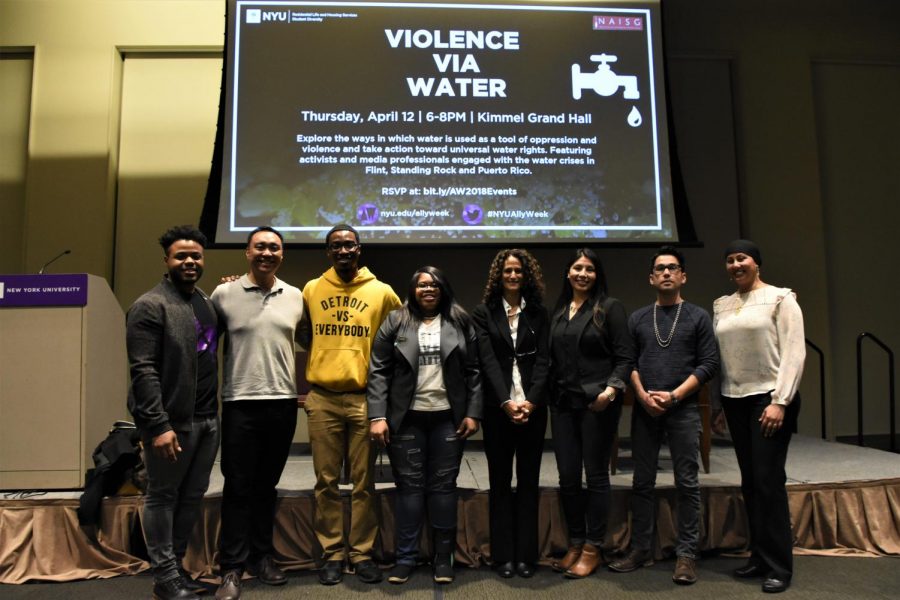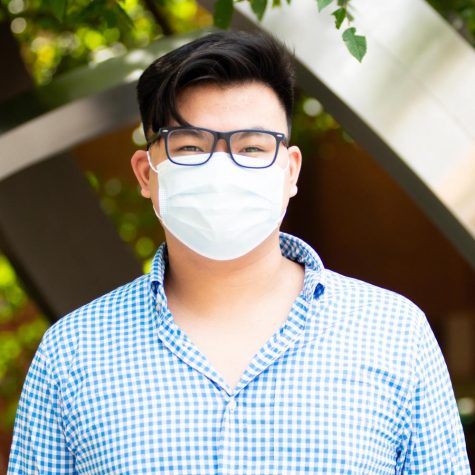Water Activists Speak on Flint, Puerto Rico Crises
The panelists at the Violence Via Water event in Kimmel Grand Hall pose for a photo.
April 16, 2018
On April 12 in the Grand Hall of the Global Center for Global Center for Academic and Spiritual Life, NYU’s sixth annual Ally Week came to a close with “Violence Via Water,” a two-hour long discussion on how water is used as a tool of oppression, particularly for people of color.
The six members leading the discussion were educators, activists and journalists of color.
Among the educators was CAS Assistant Professor Dean Itsuji Saranillio, who teaches the Food, Land, and Power course in the Social and Cultural Analysis department.
He explained that having journalists included in the conversation with activists is important because they can highlight the challenges of reporting the stories of struggle especially in communities of color.
“If people are unaware of these types of issues, it’s not because people are ignorant or lazy or doing the work of becoming informed,” he said. “There’s a certain kind of silence where these kinds of stories are not being told.”
This silence and exclusion especially pertains to race, more specifically to indigenous people, according to Oglala Lakota and Chicano journalist Simon Moya-Smith, author of the upcoming book, “Your Spirit Animal is a Jackass.”
“At the end of the day, the reason people have continued to exclude indigenous people from these conversations is because we do make people feel uncomfortable,” Moya-Smith said during an audience Q&A session.
In 2014, Moya-Smith also appeared on “The Daily Show with Jon Stewart” in a segment by then correspondent Jason Jones about the name of the Washington Redskins. In the segment, Moya-Smith, along with seven other Native Americans, are brought into a room with Redskins fans, one of whom is black.
“That idea of having an indigenous person come into the room and make people uncomfortable is something I also have to deal with not just with white people,” Moya-Smith said. “I had a black guy in redface whitesplain Redskins to me. What the f-ck?”
When it comes to personal accountability, Sarah Sunshine Manning, a Shoshone-Paiute journalist, said in the Q&A that one way to help with personal accountability is making people uncomfortable.
“You have to be uncomfortable to grow,” Manning said.
Unfortunately, even the stories that have been told and reported on may also fall flat in making a difference.
Among the activists was LaShaya Darisaw, a water crisis activist and Flint organizing director with Michigan United and resident of Flushing, Michigan, a city that is dealing with the water crisis. Her participation in the discussion is especially relevant as in the week prior to the panel, Michigan’s governor announced that it would be ending its free water bottle program and closing its Point of Distribution.
“The problem is still very real and the thing is, it’s no longer in the media as much as it used to be,” Darisaw said. “It’s dying down. However, we still have problems. We still don’t have clean water. The water PODs just closed on Friday, but all the homes still haven’t been tested for things other than lead.”
On April 25, the Flint water crisis will have reached its fourth year. While the closing of PODs in Flint received coverage in those years since the crisis first found its way onto the front page, not much has changed — save for the decline in media coverage.
Keeping an older, but still important story relevant is something that Front Page Editor of the HuffPost Philip Lewis is always thinking about, especially for Flint since he is from Michigan.
“It’s up to us to find new stories and new angles,” Lewis said. “The thing is the headlines, the big news stories, might have faded away, but there are still thousands of people living in the city that have stories that they want to tell and get out there. So it’s up to us to find those stories and amplify them.”
Last month, Lewis wrote an article named “Don’t Forget About Flint, Michigan” and hoped to turn the attention back onto Flint.
While conversations about water in the context of the people who use and need it were very much at the center of the conversation, Professor Saranillio said that the issue of water is also representative of the environment.
“I think the issue of water helps us to understand the moment that we’re in today so that we have to start to understand that the environment is not just a backdrop to human events,” Saranillio said.
He brings up the issue of the increasing occurrence of natural disasters and the unprecedented nature of several of these incidents, including Hurricane Maria and the state in which it left Puerto Rico.
“It requires us to start to think more about the environment as a central player in the moment that we live in,” he said. “So that we can start to think about alternatives to the system that is actually facilitating these extreme weather patterns.”
Conversations like “Violence Via Water” are the point of NYU’s Ally Week, which took place from April 9 to 13. Currently in its sixth year, this annual tradition features spaces or “zones” for discussion, spanning across ally groups for Islam, undocumented students and disability justice among other groups of micro-communities.
In a letter to the NYU community, President Andrew Hamilton emphasized the value of intellectual conversation.
“Indeed, it is through these sometimes difficult dialogues that we can best learn how to engage with people and ideas that are new to us, and to discover what connects us, as well as what distinguishes us,” Hamilton said.
NYU’s Center for Multicultural Education and Programs planned much of the event, where “Ally Week” T-shirts were in abundance
Oriana Miles, an NYU graduate student and CMEP employee, said that Ally Week is an opportunity to clear up terminology surrounding the term “ally.”
“It’s a process, a goal, very similar to social justice,” Miles said. “Talk about what are you doing in your practice to stand up for others, specifically with the privileges that you have.”
For Lewis, the best way to be an ally is to research and talk to marginalized groups such as Native Americans to gather their voices and amplify them.
“There are people who want to be talked with so being an ally is just elevating those voices however way you can,” he said.
Email Paul Kim at [email protected].

























































































































































